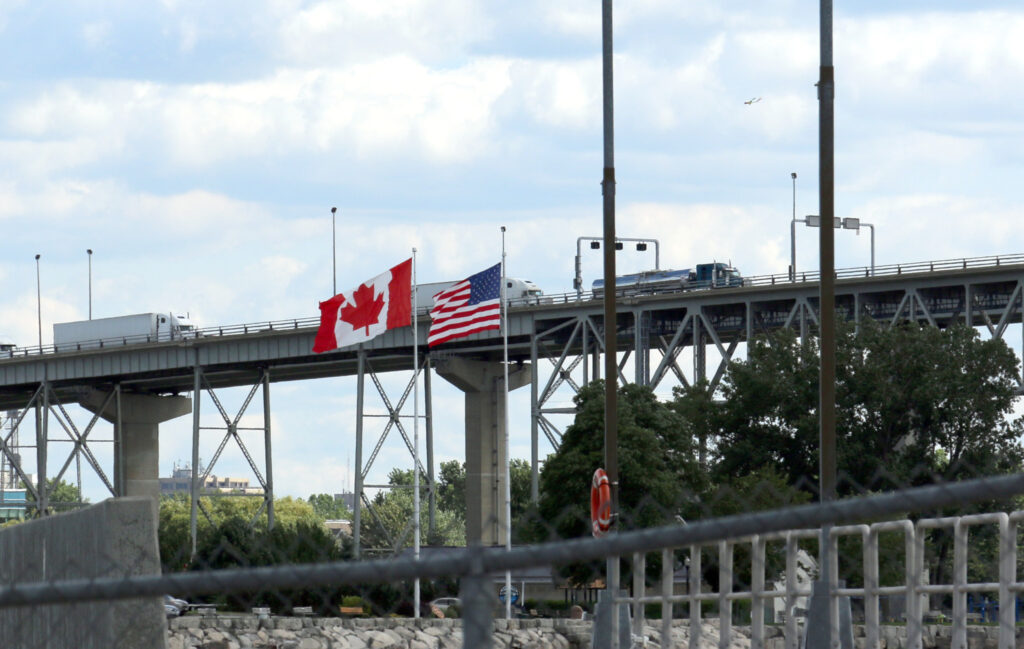Canada Day marks dawn of new CUSMA trade deal
TORONTO, Ont. – Neighborhood fireworks were celebrating Canada Day yesterday, but trade organizations were also celebrating the new Canada-U.S.-Mexico Agreement (CUSMA) that now governs every load to cross the border.
About 10 million trucks cross the Canada-U.S. border in a typical year, accounting for about 70% of trade with the U.S.

This is no typical year, however. The border itself remains closed to anything other than essential traffic like trucks until at least July 31, under pandemic-related restrictions. While truck crossings are improving, the volumes are still lower than they were a year ago, as industries face an economic downturn relating to Covid-19.
There were 104,247 truck drivers who crossed into Canada from June 15 to 21, up from just over 101,000 the previous week. But that was still down from 116,613 seen in the same period in 2019.
The negotiation process for a new deal itself was triggered by U.S. President Donald Trump, who introduced steel and aluminum tariffs and threatened to tear up the previous North American Free Trade Agreement (NAFTA) that had governed cross-border trade since 1994. In the years since 1993, Canada’s trade with the U.S. more than doubled, and it increased nine-fold with Mexico.
“CUSMA is protecting and nurturing the growth of the $1.5 trillion in trade between the three signatory countries. It is a great way to celebrate Canada Day by securing a vital and fair trade agreement with our key trading partners,” said Canadian Trucking Alliance (CTA) chairman Scott Smith. “CUSMA will remove uncertainty in the supply chain, which is much needed during the Covid-19 crisis.”
“This is a tremendous day,” said American Trucking Associations (ATA) president and CEO Chris Spear, “thanks to the efforts of many people in our three nations, USMCA is officially taking effect. It is the first significant revision in our nation’s trading relationship in nearly three decades and will foster growth in all three nations at a time when the economy can use a shot in the arm.”
The order of letters in the deal’s name differs by country. South of the border, it’s known as the U.S.-Mexico-Canada Agreement.
In another statement, the Motor and Equipment Manufacturers Association (MEMA) referred to it as a “strong, bipartisan achievement by Congress and the Trump Administration,” adding that it will strengthen North American supply chains, U.S. job creation and economic growth. “With 90% support in Congress, the USMCA may prove to be a new model for trade in the hemisphere and beyond.”
Among other changes, CUSMA places new rules on the origin of materials and components used to make trucks themselves. Seventy percent of a truck’s identified principal parts – including things like clutches, drive axles, and wheels – now need to come from this trade region, along with 60% of complementary parts like brakes and lithium-ion batteries. Those levels will be phased in over seven years.
Both levels are higher than the NAFTA-imposed limits of 60% of principal parts and 50% of complementary parts. But aftermarket replacement parts are not affected by the limits.
While the agreement is meant to offer certainty for trade, there is still some uncertainty to address. Rumors of other potential aluminum tariffs are still emerging, despite split opinions within the U.S. industry itself.
The Owner-Operator Independent Drivers Association (OOIDA) also sees the new deal as a tool to block unsafe Mexican carriers from taking U.S. jobs.
“The USMCA creates a thorough review process to identify and remove Mexico-based carriers and operators that pose material economic harm to American truckers,” said OOIDA president Todd Spencer. “This means greater scrutiny of entities in cross-border trucking and enforcement of labor provisions.”
“This will hopefully prevent or reduce Mexico-domiciled carriers that are exploiting our laws from operating on U.S. highways, which has significantly lowered wages for American drivers across numerous segments of trucking,” he said.
“Very little changes for trucking today, but going forward, USMCA will not only keep industry in North America, benefiting trucking, it will likely attract new factories and economic activity, which will lead to more trucking activity,” said ATA chief economist and senior vice-president of international trade policy and cross-border operations.
“International trade, and specifically trade with the US and Canada and Mexico are tremendous drivers of freight for our industry. I expect that growth related to USMCA will provide a real boost for trucking in the coming years.”
Have your say
This is a moderated forum. Comments will no longer be published unless they are accompanied by a first and last name and a verifiable email address. (Today's Trucking will not publish or share the email address.) Profane language and content deemed to be libelous, racist, or threatening in nature will not be published under any circumstances.
YEA EURE I AM POSITIVE THE US CAME OUT SMELLING LIKE A ROSE IN THIS DEAL AND CANADA GOT SHAFTED AGAIN.JUST LIKE NAFTA SO MANY YEARS AGO MEXICO BENEFITED OUT OF THAT ONE BY GETTING INDUSTRY TO MOVE THERE BECAUSE OF THE WORKING CONDITIONS AND THE LOW WAGES WHY WOULDN’T ANY COMPANY GO THERE TAKING AWAY JOBS IN THE US AND CANADA. SO GIVE YOURSELF A BIG PAT ON THE BACK CANADA UNTIL OUR NIEGHBORS TO THE SOUTH START SCREWING US AGAIN AND YOU KNOW THEY WILL EVENTUALLY.SO CONGRATULATIONS US YOU DID IT AGAIN YOU GOT YOU’RE OWN WAY AGAIN I HOPE THERE HAPPY DON’T SAY WE WERE WARNED ABOUT GETTING ABOUT THIS BECAUSE I AM SURE IN ABOUT A YEAR FROM NOW WE WILL SEE SOMETHING ON THE NEWS ABOUT SOMETHING OR SOMEBODY SAYING THERE GETTIN SCREWED BY THIS DEAL AND THERE WILL BE A LOOPHOLE FOR THE US AND NOTHING WE CAN DO ABOUT IT JUST WAIT AND SEE WAY TO GO CANADA.